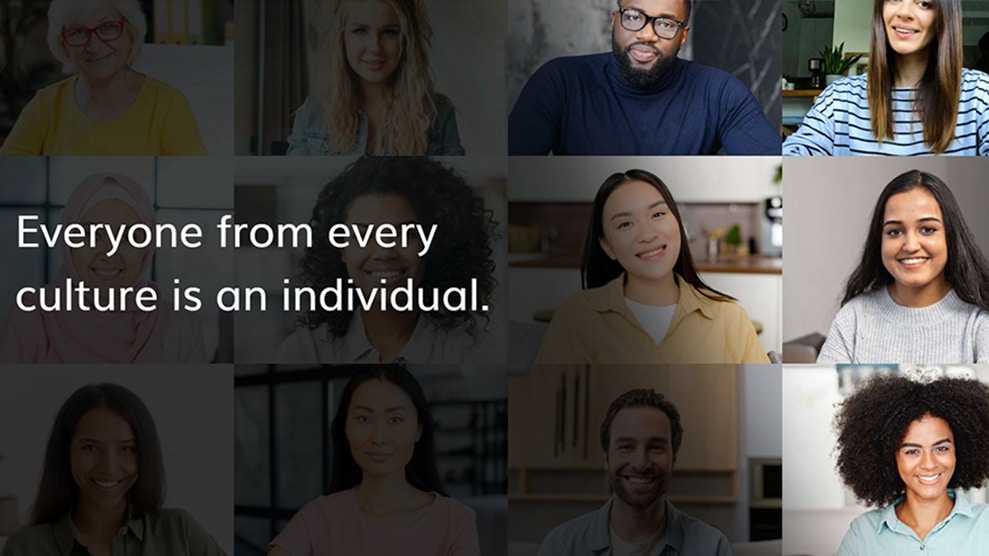
Cultural Competency Training
Elevate innovation and productivity within your organization by leveraging diverse perspectives.
Course description
Traliant's Cultural Competence training is a 30-minute course that introduces employees and managers to the importance of cultural competence in the workplace. It identifies practical strategies and actionable steps employees can take to avoid misunderstandings, foster respect and ensure effective communication and interactions across diverse cultures.
A healthcare version of the course is also available.
ONLINE TRAINING
Cultural Competence Training

This course covers these topics and more:
- What is culture?
- What is cultural competence?
- How culture can impact the way we conduct ourselves at work
- Business benefits of cultural competence
- Practical skills to navigate cultural differences effectively in the workplace
- Differing cultural expectations and norms about:
- Authority and workplace hierarchies
- Punctuality and multitasking
- Individualism versus interdependence
- Comfort or discomfort with uncertainty
- Separation of work and personal life
THE TRALIANT DIFFERENCE
Compliance you trust.
Training and solutions you love.

Legal expertise
Our in-house legal team is at the heart of our course development, writing content and ensuring compliance. As laws change, they provide real-time updates so you can trust your training is accurate and up to date.

Brilliant training
Each year we release brand-new, cinematic, Netflix-style courses with fresh stories, interactive scenarios, and industry-specific nuance. The result? A lasting impact on your culture and an experience employees will love.

Innovative solutions
With TikTok-style micro reels, advanced AI translations, phishing simulations, policy and handbook services, and analytics in one scalable platform, we make compliance simple and engaging now and into the future.

Valued partnership
Our main focus? It’s all about making your job easier. We do that with unmatched responsiveness and seamless deployment, dedicated to driving your success.
KEY FEATURES
Why you'll love our training
It’s time to embrace a new era of online training with a valued partner who will ensure seamless implementation, a truly enjoyable learning experience, and courses with continuous compliance you can trust.
Compliance expertise
Traliant's in-house legal expertise ensures training is accurate and kept up-to-date with any regulatory changes.
Accessible to users with disabilities
Traliant provides an inclusive experience for all users, including those with disabilities, by going beyond Section 508-C standards and offering WCAG 2.1/2.2
Story-based learning
Our story-based approach blends leading instructional design with Hollywood talent to produce engaging, interactive and nuanced training.
Course administration
Traliant makes it simple to roll out training to your workplace and provide technical support directly to your employees at no additional cost.
Course customizations
Tailor courses to include your logo, relevant policies, workplace images, and more. Traliant can even customize the course with scenarios that take place in your own workplace environment.
Translations
Training is available in English, Spanish and is supported in over 100 languages.
COMPLIANCE EXPERTISE
Your partner in training compliance

Uniquely qualified in-house compliance team
Our exceptional in-house Compliance Advisory Team is led by Michael Johnson, Chief Strategy Officer and former U.S. Department of Justice attorney who has provided training and guidance to organizations like the Equal Employment Opportunity Commission, Google, the United Nations, and the World Bank.

Keeping you compliant, effortlessly
Keeping up with the complex web of employment laws — especially if your workforce spans multiple states — can be tricky. That’s why we offer a streamlined training solution that ensures you stay compliant with federal, state, and local regulations, so you can focus on what matters most: your team.

Simplifying your policies and handbooks
Crafting an employee handbook that meets legal standards can be daunting. Let us ease the burden. We help you navigate regulatory changes to ensure your policies and handbooks not only comply with the law but also reflect industry best practices.
What to consider when choosing the most effective cultural competence training

- Create a more inclusive and welcoming workplace: Cultural competence helps to build a culture where everyone feels respected, valued, and comfortable sharing their perspectives.
- Improve communication and collaboration: An understanding of cultural competence helps employees to understand different cultural norms and communication styles, leading to more effective communication and collaboration among diverse teams.
- Enhance customer service and client relationships: Cultural competence is essential for providing excellent customer service in a globalized marketplace.
- Empower employees: Training provides employees with the knowledge and skills to interact effectively with people from diverse backgrounds, which can lead to greater confidence and comfort.
- Strengthen your organizational culture: Training helps to build a culture of respect, understanding, and inclusivity.
- Boost innovation and creativity: Diverse teams with strong cultural competence are better positioned to develop creative solutions and to achieve success.
- Be open to learning: Be curious about different cultures and willing to learn about their beliefs, values, and practices.
- Develop empathy and understanding: Try to see the world through the eyes of others, and to understand how different cultures shape perspectives and behaviors.
- Practice active listening: Pay attention to both verbal and nonverbal communication, and ask clarifying questions.
- Be mindful of your own biases: Recognize your own cultural biases and assumptions, and strive to challenge them.
- Use respectful language: Avoid using stereotypes or generalizations, and choose your words carefully to avoid misunderstandings.
- Time: Different cultures may have different perspectives on time, such as how meetings are scheduled, deadlines are met, and schedules are followed.
- Personal space: Cultural norms may dictate how much personal space people prefer.
- Physical contact: Cultural norms can vary significantly when it comes to physical contact, such as handshakes, hugs, or pats on the back.
- Social roles: In some cultures, there are clear distinctions between social roles, such as gender roles or roles related to authority.
- Communication styles: Different cultures may have different communication styles, such as directness versus indirectness, verbal versus nonverbal communication, and the use of humor.






